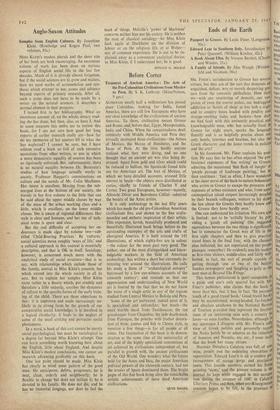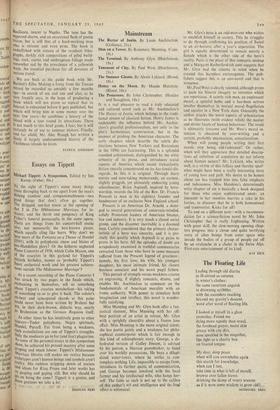Ends of the Earth
Edward Lear in Southern Italy. Introduction to and Windus, 21s.)
MR. FINER's introduction to Greece has several v virtues, but they are of the sort that demands ao Bar anguished, defiant, wry or merely despairing geS• retr ture from the romantic philhellene. How dare ago we—with our smattering of demotic, our sur verb picion of even the tourist police, our bedraggled boo addiction to 'hotels of sleep' at five bob a night inte and to country buses loaded with poultry and whi strange-smelling bales and baskets—how dare hex we find fault with this eminently practical and Isla] knowledgeable man, who has actually lived in is n Greece for eight years, speaks the language cert fluently and is so helpfully precise about not and only hotels, tavernas and beaches, but also the live Greek character and the latest trends in politics Car and the arts?
In his foreword, Mr. Finer explains his pest. tion. He says that he has often enjoyed 'the pro' fessional exponents of fine writing' on Greece, admiring the occasional 'fine flash of insight' or 'purple passage of landscape painting,' but he then continues: 'Just as often, I have wondered Mil at the sheer nerve of the back-to-nature bohemians who arrive, in Greece to escape the pressures and expenses of urban existence and who, from some cosmopolitan island outpost increasingly peopled by their beatnik colleagues, venture to lay doW0 the law about the Greeks they hardly know and the Greece they have hardly seen.'
One can understand his irritation. His own alto is limited: not to be 'artfully literary' by prcr viding a 'gaudy oil painting' (the suggested equivalence between the two things is significant), but to summarise the Greek way of life in the first eight chapters and then to give practical travel hints in the final four, with the classical sites indicated, but not expatiated on (no purple passages, remember). He evidently sees his readers as first-time visitors, middle-class and fairly well' heeled; in fact, the sort of people capable of getting through 'one or two of the bulkier Sunday newspapers' and 'laughing as gaily as the next man at Beyond The Fringe.' This honest philistinism is (just) acceptable in a guide and one's only quarrel lies with Mr. Finer's publisher, who claims that the book i9 more than this, that it has, in fact, 'the personal touch of a good travel book.' Good travel book" may be misinformed, wrong-headed, far-fetched and absolute anathema to the National Bureau of Tourism provided they represent the involve' ment of an interesting man with a country be loves—or even loathes. Nevertheless, although ie my ignorance I disagree with Mr. Finer's jolly view of Greek politics and personally regard the Xenia hotels he so admires as the ruination of Sounion and Nauplia, etc. etc., I must insist that the book has many virtues.
Norman Douglas's Calabria was full of sun' wine, people and the endearing absurdities of superstition. Edward Lear's is all a. sombre plc" turesqueness of savage gorge and precipiced town. This lovable eccentric earned his twilit painting 'views,' and the present volume is the journal he kept while engaged in this occupa" Lion during the summer of 1847 in Calabria Ulteriore Prima and then, when pre-Risorgimente tensions began to be felt, in the province of
asilicata, nearer to Naples. The tone has the expected charm, and an occasional flash of poetic Vision, but is still that of a hard-working man who is reticent and even prim. The book is embellished with sixteen of the resultant litho- graphs, darkly rich compositions of piled build- ings, rock, cactus and umbrageous foliage made somewhat sad by the prevalence of a yellowish Wash. An essential purchase for all devotees of serious travel.
We are back at the guide book with Mr. 13artlett's Elba. Making a foray from the Tuscan retreat he recorded so amiably a few months ago—in search of sea and sun and also, as he Very frankly says, in the hope of producing a book which will not prove so topical that its Interest is exhausted before it gets published, but Which will bring him in some money over the next few years—he combines a history of the Island with a tour round its attractions. There Is not much to this brief guide, I fear, but it will certainly be of use to summer visitors. Finally, and far afield, Mr. Alec Waugh has written a lively if largely undocumented history of the Caribbean islands he loves.
PATRICK ANDERSON



































 Previous page
Previous page